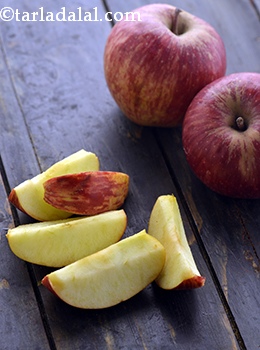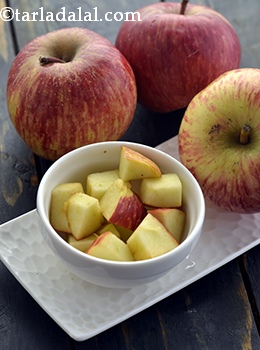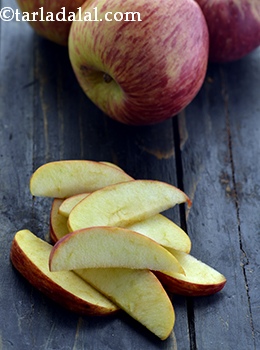Apple cubes
.jpg)
First core the apple and cut it into segments or strips. Then, line up the strips with your non-working hand and cut them into square pieces. Cube them as per the recipe's specifications regarding the size of the cubes (for example, "cut into ½-inch cubes"). Generally apples are cubed without removing the skin, but if the recipe requires peeled apple cubes, peel the apple and then cut into cubes of desired size.
Apple skins swirls
.jpg)
Apple swirls can be made by carefully moving a sharp thin knife on the inner side of the skin, with a twisting or whirling motion to make spiral shaped pieces. The swirls can be used to garnish desserts, apple pie or any fruit dish.
Apple sticks
.jpg)
To get Apple sticks, wash and clean the apple and using a sharp knife, cut vertically into half. Place one half on a chopping board and remove the seeds and core of the apple. Make vertical cuts using a sharp knife and cut into thick long sticks of 1/2" to 1" thickness. Cut more sticks from remaining apple halve. Use as required. To prevent the apple sticks from turning brown, place them in salted water till used.
Apple wedges

Select a sharp chef's knife. If required by the recipe, peel the apple, else start with the unpeeled fruit. Chop the apple into half and scoop out the seeds from the centre. Place the apple on a chopping board. Hold your knife comfortably, with your forefinger running down one side of the blade and your thumb pressed against the opposite side, and chop the apple into thick segments. Apple wedges are wonderful to garnish any cake or any dessert.
Chopped apple

Start with a peeled or unpeeled apple, as desired. Take a sharp knife and slice the apple from the top to remove the stem. Then cut it into half from the centre. Cut the half portion into another half and remove the seeds from centre. Chop the segments into small pieces approximately ¼ inch in diameter. If the recipe calls for the apple to be "roughly chopped," make the pieces slightly larger.
Deseeded apples

Apple corer is used to extract the core from the apple without cutting the apple into sections and then individually cutting out each part of the core. This tool has a circular cutting edge that is forced down into the apple, allowing the apple to remain whole so it can then be easily sliced into sections for eating it out of hand or baking it whole with the outer skin intact.
Grated apples

Use a grater to grate the apple thinly or thickly as required by the recipe. You can use peeled or unpeeled apple as per the recipe requirement. Thinly grated apples can be added to beverage, while thickly grated ones can go into salads.
Sliced apples

Scoop out the top and bottom stems of the apple using a lemon baller. Peel the apple, if you would like. Then, cut the apple in half. Slice using a sharp knife by cutting vertically across the cutting board. Slice the apple thinly or thickly as per the recipe requirement. Sliced apples are often used to garnish apple pies, apple crumble or stewed apples.
• Apples are a favourite fruit, the world over. They are enjoyed as it, or added to salads, baked dishes, juices, other beverages and a variety of cooked foods too.
• Once cut, apples will discolour if left open to the air. To avoid discoloration, dip in an ascorbic juice (such as pineapple or lemon), sprinkle cut surfaces with lemon juice or cover with a cling film and keep refrigerated till use. Click on to know
how to store whole apple.
• Bake an apple till soft, remove the core, and stuff with other fruits, brown sugar, raisins, or cinnamon, to make a delectable dessert.
• Apples are a natural way to sweeten cooked cereals, such as oatmeal, and they make wonderful desserts when baked in pies, cakes,
muffins, and
Apple cobblers.
• Dried apple slices keep well and make a fine snack.
• Hot
Apple cider is best when your are suffering from cold or during rainy season.
How to store apple, seb
• Store apples in a plastic bag in a cool and dark place of your refrigerator. Cold, humid storage ensures that apples maintain their crispness, juicy texture and full flavour.
• Cut apples turn brown quickly, especially when chopped finely or grated. Sprinkle a little lemon juice on the surface to prevent this.
Health benefits of apple, seb
Being low in sodium,
apples are effective against
high blood pressure because of its diuretic effect. Don't peel the fruit to get maximum
apple benefits. Two-thirds of the
fibre and lots of
antioxidants are found in the peel. Apple benefits
diabetics as the
soluble fibre assists in regulating blood sugar and is
heart friendly. See detailed
9 health benefits of apple.
Glycemic Index of Apple, Seb, Safarchand.
Apple has a Glycemic Index of 39 which is low. Glycemic Index are for foods you eat, ranks carbohydrate-containing foods by how quickly they digest and raise your blood sugar or glucose levels. Foods rank from 0 to 50 are low GI, 51 to 69 are medium and 70 to 100 are high. Foods that are high in GI are not suitable for weight loss and diabetics. Foods like Apple have a low GI and hence don't spike your glucose level as they are absorbed slowly. Great for weight loss.